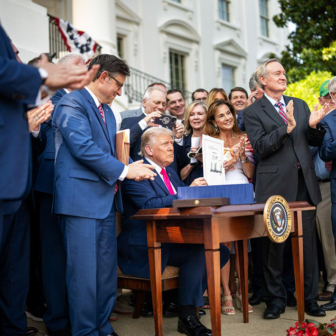Earlier this month the Washington Post published an article by one Doug Sosnik, “a senior adviser to President Bill Clinton from 1994 to 2000,” which made the not especially spectacular assertion that “if Trump isn’t removed from office and doesn’t lead the country into some form of global catastrophe, he could secure a second term.” Indeed, a “clear path” to that outcome could be discerned. The op-ed concluded with the warning that it “would be as big a mistake to assume that Trump cannot win re-election in 2020 as it was for those of us who never thought that he could become president in the first place.”
Well, duh. All nicely caveated, not exactly out on a limb, the embedded notion being that a second Trump term remains less than likely, but not impossible. It could happen.
But a naughty Post headline-writer jazzed it up with “Trump Is on Track to Win Re-election,” thus inverting the probabilities, and that person earned his or her wages that day, because the article did roaring trade and was syndicated around the planet, including by London’s Independent and, down under, our own Fairfax papers.
A meme was born. Googling “Trump is on track to win re-election” returns multiple references to Sosnik’s piece — such as “The Washington Post Admits: Trump Is on Track to Win Re-election” and “Trump Is on Track to Win 2020 Re-election Says Long Time Far Left Democratic Strategist” — showing that comment-section contributors aren’t the only ones who read the headline and skip the article.
This spawned, among others, a truly dreadful article in an online journal called Inquisitr that screamed, both at top and in the body, that Trump is “heavy favourite” to win in 2020. Noting (need we say) that “according to Democratic strategist Doug Sosnik, Trump remains ‘on track to win re-election,’” the author examined online betting markets and concluded that “Trump’s chances of winning re-election, according to people willing to put their money where their mouth is, rank far higher than in the national polls.”
By “favourite,” the writer meant that more money has been bet on Trump than any other individual the betting markets can think of. Which is not surprising, because who else is there?
The article quoted odds at Ireland’s Paddy Power, whose site is blocked in Australia, where a Trump re-election was apparently paying US$2.75. An Australian site (no free advertising here) was paying $3.40 this morning (no conversion needed; the same odds apply regardless of currency) for a Trump win (second “favourite” is — you guessed it — vice-president Mike Pence, on $9.00) from a field of fifty-eight. These markets, containing celebrities and wild cards, are not meant to be taken too seriously, but if we do (and ignore the fact that without a “somebody else” option it’s not a complete field), then the implied probability of a Trump second term is just 15 per cent.
“Heavy favourite” indeed.
Will Trump be in the Oval Office in 2021? Who knows? We’re all equally qualified to try our hand. I put the chances of his still being president and being the Republican candidate at around 60 per cent (so a 40 per cent chance of an earlier change at the White House) and, assuming he is, his odds of re-election at, say, 40 per cent, which combine to a 24 per cent chance he’ll be victorious in three years’ time. About one in four; so I’m more optimistic for the Donald than the punters.
One element that is hard to dispute in the general commentary, and the articles referenced above, is that the economy will be crucial. An uptick will gazump most of the clownish and embarrassing behaviour and the damage to his country’s international standing. And after that result a little under a year ago (has it only been that long?), and after Jeremy Corbyn’s impressive performance in Britain in June, and even after our own close outcome in July last year (but not “Brexit” — I never did comprehend the wide assumption that Brits would vote No), we really must discard our well-learned assumptions about who’s electable and who’s not in this low partisanship, post-GFC world.
But first we have to get through these next three long years. ●





